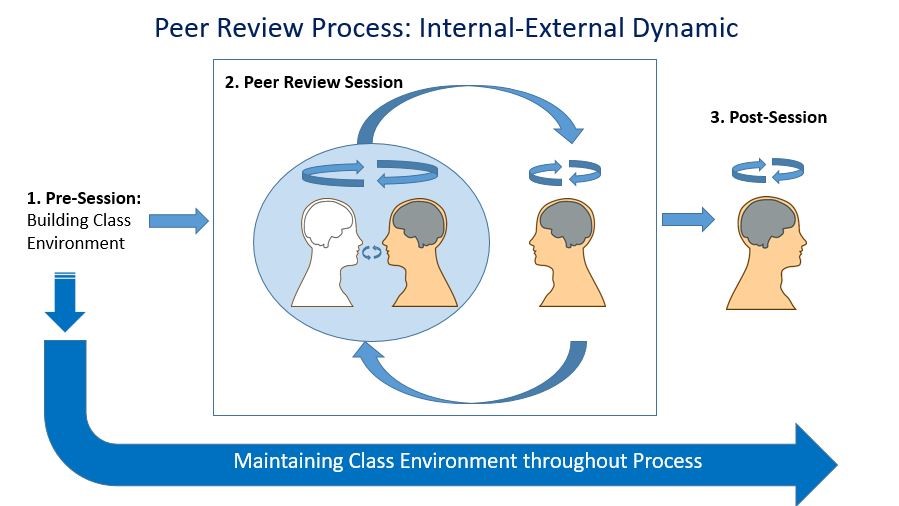A team of faculty, staff and students presented our research on student peer review at Community of Scholars Day: “Critique Creates Community? Effects of Peer Review and Metacognitive Strategies”. Inspired by the culture of critique at Lesley’s College of Art and Design (LUCAD) and with the shared goal of improving students’ analytical writing and other assignments, three faculty gathered a team to investigate peer review methods using a research-based approach. Our background research on peer review and the results of empirical research with our own students were closely aligned, revealing the many benefits of peer review that can be achieved under specific conditions. As a result of our inquiry, we have been revising our peer review processes, excited by the improvements seen thus far and the possibility for enhanced skills in many areas. Below, we will discuss key components and benefits of the peer review protocol we first drafted in the fall of 2016 and updated this year.
Our peer review protocol is driven by the Dialogic Feedback Cycle, which, importantly, includes extensive use of metacognitive learning strategies. Critical to the peer review process is the dynamic between students’ individual (internal) processing and pairs’ external collaborative processing (see Figure 1 below). Students work both individually and with peers in order to reflect on and revise their work. Throughout this process, the writer drives the process, first by identifying their goals and requesting specific areas for feedback, and at the end, by explaining their choices for revising their work to the instructor.
Before engaging in peer review sessions, the instructor builds an environment that prepares students to participate in a committed way to this collaborative process (Step 1). This is achieved by discussing benefits and challenges; explaining and modeling peer review; and, most importantly, creating a trusting relationship among students. Many students dislike or distrust the peer review process based on previous experience – including concerns that peers will not take their work seriously, or that they themselves will be unable to review peers’ work satisfactorily – so discussing students’ insecurities and establishing goals aids in building trust. Peer review sessions focus on collaborative discussion, driven by the needs of the writer. (Step 2). Following peer review sessions, students determine the most valuable feedback to revise their work, and then explain to the instructor how they used feedback in their revisions. This closes the loop on the feedback cycle (Step 3).
There is a growing realization that self-evaluation skills should be a major goal of higher education (1). Learners’ ability to effectively evaluate their own work greatly enhances their success, both in school and later in the workplace (2). Research on peer review in higher education and our own work with our students has shown a multitude of benefits, including improvements in collaborative skills; self-confidence, understanding of subject matter; connection with peers; metacognition; and transfer of skills beyond the classroom (3). In our study, students reported a strong connection to peers from the peer review process, which may have implications for general education and retention. As we continue to apply research to our practice in the classroom, we invite interested faculty members to join us.
If you have questions about our work or would like to join us in our research and efforts to improve teaching practice via peer review, please contact Liv Cummins (lcummins2@lesley.edu).
Peer Review Team:
Research and Practice:
- Summer Clark (Assistant Professor of Literacy Education, CLAS)
- Liv Cummins (Associate Professor of Creative Writing and Drama, CLAS)
- Kimberly Lowe (Assistant Professor of European History, CLAS)
Lesley student research: Casey Bogusz (CLAS)
Research lead for Lesley student research: Linda Pursley (Research and Assessment)
Background research support: John McCormick (eLIS):
Citations:
- Boud, D., & Dochy, F. (2010). Assessment 2020. Seven propositions for assessment reform in higher education.
- Nicol, D. (2010). The foundation for graduate attributes: Developing self-regulation through self and peer assessment. The Quality Assurance Agency for Higher Education. Scotland.
- Pearce, J., Mulder, R., & Baik, C. (2009). Involving students in peer review: Case studies and practical strategies for university teaching.

